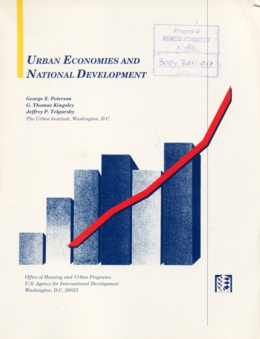 This report is the product of research conducted by The Urban Institute under the sponsorship of USAID’s Office of Housing and Urban Programs. It focuses on the relationships between the urbanization process and national economic development. The study is based on original field work, a review of recent analytical literature, and on the results of three seminars organized by The Urban Institute for USAID. The seminars focused on the relationship between urban development and macroeconomic policies; the impact of the functioning of urban land markets and systems of urban infrastructure provision on the national economy; and the interrelationships among urban development, urban labor markets, urban-rural linkages, and environmental conditions.
The first chapter of the report explains why many developing nations (along with international donors) have changed their view on the role of urbanization in the development process. Most are now coming to see urban growth more as a positive opportunity than a problem. The chapter also offers an economic framework for analyzing urban size and efficiency.
The next chapter considers the relationships between urban development and macroeconomics policy by focusing on the effects of the structural adjustment programs of the past decade. A special section looks in depth at the linkages between urban housing finance and macroeconomics policies.
The third chapter explores urban economic development from the local perspective. It examines how economic growth is (and can be) affected by local policies influencing land and infrastructure markets, local subsidies designed to attract industry, and public private cooperation in the formulation of local development strategies that take advantage of a locality’s competitive strengths.
The implications of the study’s findings for policy and research are discussed in the final chapter. Contents: ABSTRACT INTRODUCTION: WHAT THIS REPORT IS ABOUT CHAPTER 1. RETHINKING THE ROLE OF URBAN AREAS IN NATIONAL ECONOMIC DEVELOPMENT
The Case for Rural Development
Recent Reassessments: A More Positive View of Urbanization
An Economic Framework for Analyzing the Efficiency of Urban Growth
Conclusion: Opportunities for Efficiency Gains CHAPTER 2. THE STRUCTURAL REFORM AGENDA AND ITS URBAN IMPACTS
Macro Reform Strategies that Affect Cities
Special Links among Housing, Infrastructure and National Economy
Conclusion: Policy Linkages between Cities and the National Economy CHAPTER 3. ROLE IN URBAN ECONOMIC DEVELOPMENT
Competition for Economic Growth
Importance to Local Economic Development of Appropriate
Targeted Economic Development Strategies
Conclusion: What Can Local Governments Do To Help CHAPTER 4. POLICY PRIORITIES
Government as Enabler and Facilitator
Guidelines for Urban Economic Development NOTES REFERENCES
Post Date : 30 Juni 2009
| 